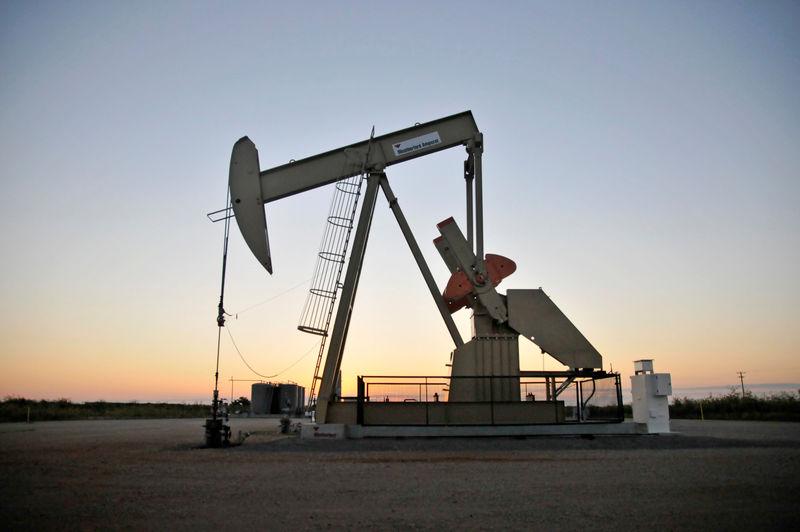 © Reuters. FILE PHOTO: A pump jack operates at a well site leased by Devon Energy Production Company near Guthrie,
© Reuters. FILE PHOTO: A pump jack operates at a well site leased by Devon Energy Production Company near Guthrie,By Liz Hampton
HOUSTON (Reuters) – Oil prices will need to rise further for energy companies to significantly expand drilling activities, according to a survey released on Thursday by the Federal Reserve Bank of Dallas.
U.S. energy companies have added rigs and boosted production to near record levels, as oil prices have more than doubled from a low of about $26 per barrel touched in early 2016.
But prices above $60 a barrel are needed to see a significant uptick in activity, according to the survey, which questioned 134 firms headquartered in Texas, southern New Mexico and northern Louisiana.
West Texas Intermediate (WTI) crude was trading at about $59.50 on Thursday, down slightly from a 2-1/2-year high of $60.01 earlier this week.
The jump in prices, coupled with technological improvements that make drilling cheaper, has pushed the U.S. rig count to 931, up about 43 percent from last year, according to data from General Electric (NYSE:) Co’s oil services arm Baker Hughes.
Slightly more than half the survey’s respondents expect the rig count to continue to climb six months from now but nearly all said oil prices need to be above $60 a barrel for a substantial increase.
Of the firms surveyed, nearly 48 percent reported an increase in spending from the previous quarter and roughly 64 percent reported an increase from a year ago. About 8 percent reported a decrease over the previous quarter, and nearly 10 percent reported a decrease from a year ago.
Services firm Keane Group in December said it had placed orders for three additional hydraulic fracturing fleets, a signal that it expects demand for production-related services to grow.
U.S. oil and gas production has climbed for five consecutive quarters, the survey found, as a deal among major global producers to cut output has helped lift prices.
Total domestic production is at 9.75 million barrels per day (bpd), according to the latest figures from the U.S. Energy Information Administration, and is expected to climb to more than 10 million bpd next year.
Of the service firms surveyed, 52 percent said they are receiving higher prices for services from a year ago, while 40 percent reported no change.
The survey’s respondents included 77 companies focused on exploration and production activities and 57 that operate in the oilfield service sector.
Fusion Media or anyone involved with Fusion Media will not accept any liability for loss or damage as a result of reliance on the information including data, quotes, charts and buy/sell signals contained within this website. Please be fully informed regarding the risks and costs associated with trading the financial markets, it is one of the riskiest investment forms possible.
Source: Investing.com


























